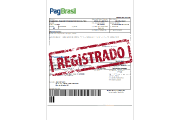The Brazilian Federation of Banks (FEBRABAN) has announced a change in the use of boleto bancário that will become effective by January 1, 2017. From then onwards, all issued boleto bancários have to be registered with a bank and the use of unregistered boletos will be discontinued. The aim of FEBRABAN and also the Central Bank of Brazil is to increase the level of transparency in the banking system.
Until today, PagBrasil, as well as other e-commerce business or PSP, issues its Boleto Express or Boleto Flash® as unregistered boletos. A registered boleto, contrary to its unregistered version, needs to be enrolled with the issuing bank. For registered invoices, banks usually charge for the issuance, for the payment and for a possible change or cancelation. In other words, there are several charges for the registered boleto, while for unregistered boletos there is only one charge for the payment. However, PagBrasil is confident that it will be able to maintain the current fee structure for its merchants, charging only for the successful payment of a registered boleto bancário.
In addition to the above, the customer’s full name, fiscal number (CPF/CNPJ) and address are required for the registration of a boleto. As PagBrasil already receives the required data from its merchants, as part of its standard implementation requirements, there will be no need for its merchants to change the technical implementation.
The registered boleto also offers two major advantages. The first and most important is an advantage for the consumer: registered boletos are automatically broadcasted via the Brazilian banking system to the buyer’s bank account. With that, the buyer can just log into his online account, select the boleto and confirm its payment. The need to type, scan or copy the barcode or number will be eliminated for customers who prefer paying via Internet Banking. In addition to that seamless payment experience for consumers, there is an advantage for merchants, who gain the possibility to automatically file an official objection for an unpaid boleto (“protesto em cartório” in Portuguese). In most cases that helps to collect the amount due, because such an official objection has an important impact on the credit rating of the buyer.
